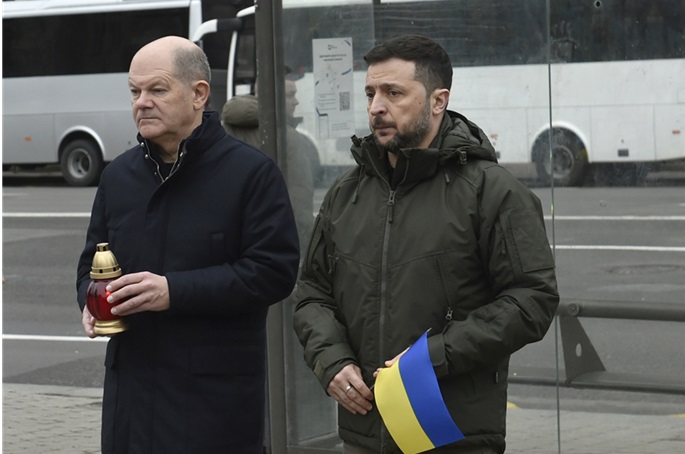Scholz pledges further German weapons in surprise Ukraine visit
Published : 02 Dec 2024, 23:16
German Chancellor Olaf Scholz arrived in Kiev for the first time in two and a half years on Monday for talks with Ukrainian President Volodymyr Zelensky, reported dpa.
Scholz and Zelensky together visited wounded Ukrainian soldiers in Kiev, including some who had lost limbs in the fight against the ongoing Russian invasion. Zelensky awarded medals to individual soldiers during the visit.
Earlier, the German leader announced further arms deliveries worth €650 million by the end of December to bolster Ukraine's defence against Russia, including battle tanks, missiles, drones and air defence systems.
"I would like to make it clear here that Germany will remain Ukraine's strongest supporter in Europe," said Scholz.
Scholz arrived on Monday morning at the railway station in the Ukrainian capital after a nine-hour trip by special train.
The visit was not previously announced for security reasons, and further details of the chancellor's itinerary in Kiev have likewise not been publicly revealed in advance.
After visiting the Kiev hospital, Zelensky and Scholz then watched a presentation of drones used in Ukraine's defensive campaign against Russia.
Among the drones on display was a German-made model from the company Helsing, designed to strike Russian armoured vehicles in combat. Another 4,000 of the drones are to be delivered to Ukraine over the next month.
The weapons package also includes two Iris-T air defence systems, 10 Leopard 1A5 main battle tanks, 60 M84 and M80 infantry fighting vehicles, 6,000 unguided missiles and 500 guided missiles.
Scholz on Monday said his trip is a sign of solidarity with a country that has been defending itself "in a heroic manner against Russia's merciless war of aggression" for more than 1,000 days.
"Ukraine can rely on Germany," he said. "We say what we do. And we do what we say."
This is only Scholz's second visit to Ukraine since the Russian invasion in February 2022. During his first visit in June 2022, he travelled with French President Emmanuel Macron and the then-Italian prime minister Mario Draghi.
During that visit, the three European leaders announced steps intended to clear the way for Ukraine to become a candidate for European Union membership.
However, Ukraine's wish for a formal invitation to join the NATO defence alliance remains unfulfilled. Zelensky is expected to raise the issue with Scholz during the visit.
On Sunday, Zelensky described an invitation to join NATO as "necessary for our survival," but added that he is not particularly hopeful to receive one, citing scepticism in the US, Germany and Hungary as reasons.
The war in Ukraine began in February 2022 with Russia's full-scale invasion of its neighbour. The Kremlin has since illegally annexed four areas in the east of the country.
Kiev has been demanding more Western weapons - including long-range missiles from Germany that Scholz has refused to provide - to help push back Russian forces.
Scholz treading careful line on Ukraine policy
Scholz has sought to strike a difficult balance in his policy toward Ukraine, with general elections in Germany expected in less than three months' time.
He has described himself as a stalwart ally of the embattled nation, emphasizing Berlin's extensive military and fiscal support, while also positioning himself as a "peace chancellor" seeking to find a settlement for the conflict.
After the United States, Germany is considered Ukraine's most important supplier of weapons, pledging or delivering around €28 billion worth of weapons and military equipment since February 2022.
Over the weekend, Scholz touted the fact that "Germany is doing more this year than the UK and France combined. You could even add a few more countries to that."
But last month, Scholz also arranged an hour-long telephone call with Russian President Vladimir Putin to discuss the war. The conversation, which was the first between the two leaders in nearly two years, attracted criticism from Kiev.
Scholz has sought to highlight his dual strategy in Ukraine policy - assuring Ukraine of further arms supplies, while ensuring that Germany and NATO are not drawn into the war - as a unique selling point for his centre-left Social Democrats (SPD).
Scholz's main rival in the upcoming election, conservative opposition leader Friedrich Merz, has criticized Scholz for being too hesitant and cautious in supplying aid to Ukraine.
Similar criticism has also been levelled at Scholz by his main coalition partners, the Greens, many of whom have expressed support for deliveries of Taurus long-range missiles and other weapons.
Merz has suggested threatening Russia with the delivery of Taurus missiles to Ukraine if attacks on the Ukrainian civilian population are not halted.
Scholz, however, accused Merz of recklessness in potentially provoking Russia - a nuclear-armed power - with the threat. "I can only say be careful: you don't play Russian roulette with Germany's security," Scholz said at the weekend.
Two populist parties strongly opposed to Germany's aid for Ukraine and sanctions on Russia - the far-right Alternative for Germany (AfD) and the populist Sahra Wagenknecht Alliance (BSW) - have also made gains in polls.
Elections are expected in Germany on February 23 after the collapse of Scholz's three-party coalition last month.
(By Michael Fischer, Bryn Stole and Andreas Stein).


